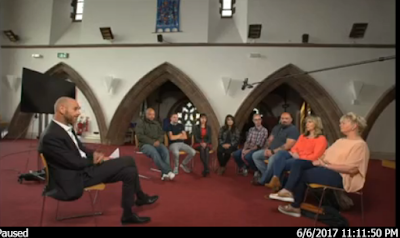David argues that the pollsters are being unfairly harangued:
Following the outcome of the 2015 general election, a mixture of anger and contempt was showered on the pollsters who had spent six weeks suggesting a different result. [Yes, and not least by Andrew Marr!]
I understand those feelings, but I do not share them.
It's a characteristically clearly-written piece, but, on reading it, my trust in the conclusions of the head of the BBC's Political Research Unit has hardly been enhanced by reading this jaw-dropping sentence from his article:
The actual result was Conservatives 38% and Labour 32%.
Er, no David...
Where, in Allah's name, did David Cowling, the head of the BBC's Political Research Unit, get 38% and 32% from?
That's really not good, is it, especially in a piece about the accuracy of pollsters?
And why didn't the BBC website fact-check this before publishing it? (Did they just assume their top polling expert must have got it right?)
********
Of course, most people won't be too familiar with David Cowling, other than seeing him on the BBC's election night programme as the BBC's official expert on such matters.
Yet here he is, on the BBC website, giving his verdict that the pollsters are still to be trusted (despite getting the result of the election wrong himself after the election!!)...
Here are a couple of examples:
SATURDAY, 1 MAY 2010
WHAT?!
Before I move on from yesterday's BBC internet election coverage, here's a post from the BBC's polling expert last night:
2205: Two of the latest polls show that only 5% separates the parties in first and third place, while in the other the gap is just 4%, says David Cowling, editor of BBC political research. "All three polls keep this election firmly in hung parliament territory, with Labour the largest party," he says. "It is still a genuinely close three-horse race."
And that was it for last night on the polls.
This puzzles me because there were (as far as I can see) only two polls last night, and neither bares any resemblance to the figures Mr Cowling is describing.
SATURDAY, 17 APRIL 2010
COME AGAIN?
David Cowling, editor of the BBC Political Research Unit, has posted this today on the BBC website's Poll Watch: Analysis:
SATURDAY UPDATE:
A Sun newspaper poll, carried out after the TV debate, suggests Labour are in third place on 28% (down 3%), with the Lib Dems on 30% (up 8%) and the Conservatives 33% (down 4%). Applying the figures from The Sun poll, which came from a YouGov survey of 1,290 people, to the BBC News website's election seat calculator, results in the following: Labour 276 seats; Conservatives 245 seats; Lib Dems 100 seats; Others 29 seats.
This is the first national poll sampled after Thursday's debate. Clearly the findings, if confirmed by the polls expected on Sunday, are important. It is worth pointing out that the two point difference between the Liberal Democrats and Labour is within normal sampling error, so it does not mean Labour is definitively in third place.
Although the headline focus may be on the Liberal Democrats appearing ahead of Labour we should not ignore the poll's suggestion that the Conservative fall in support is bigger than Labour's.
Perhaps it is best to consider this single poll as an immediate referendum on Thursday night's debate, until we have evidence, if any, that it represents the settled will of British voters.
http://news.bbc.co.uk/1/hi/uk_politics/election_2010/8626154.stm
Why does Mr Cowling emphasize the possibility of a sampling error concerning the 2% Lib Dem lead over Labour but ignore it when foregrounding the additional 1% fall in support by the Conservatives (4% compared to 3% for Labour)? Surely we 'should not ignore' that the'normal sampling error' also 'does not mean' 'that the Conservative fall in support is' 'definitively' ' bigger than Labour's'.
Now, returning to the present, David Cowling's defence of the pollsters (and pollster-monitoring pundits like him) is that, yes, the pollsters may have got it wrong this time, but:
But lest we forget, the British polling industry has provided very accurate election vote share forecasts in the past, recently as well as historically.
And yet, as you can see from the two posts from my old blog above, the pollsters - and David Cowling - were way off the scent last time too. The results in 2010, if you recall, were:
Conservatives - 36.1%
Labour - 29.0%
Liberal Democrats - 23.0%
i.e. nothing like what David Cowling was reporting, with some confidence, at the time.
David may be sticking up for himself here, as the BBC's official polling expert, but his own record (both past and present) doesn't exactly justify his confidence, does it?
********
P.S. For more from this blog about David Cowling,
please see here. It's a piece about David Cowling's BBC Academy tutorial on how the BBC should report the EU (and UKIP).
Even by the standards of the BBC, that is one heck of a biased tutorial (though he got UKIP's general election prospects right).



















